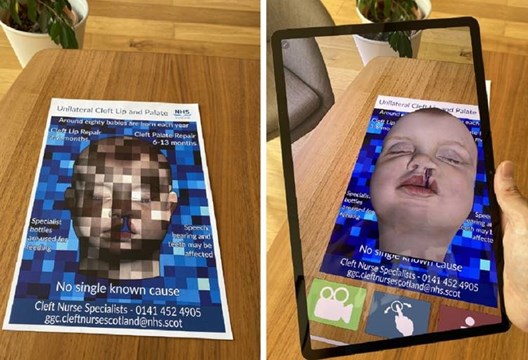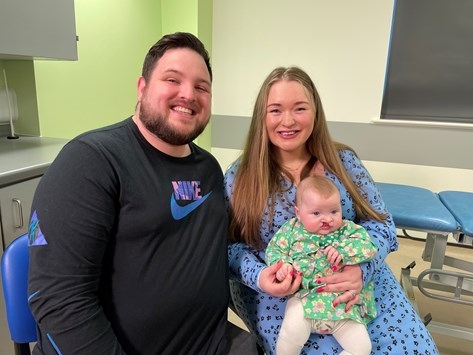Patient’s family praise world-first cleft palate technology
A family have praised ‘amazing’ new world-first technology which uses augmented reality to explain complex procedures to patients and their families.
The West of Scotland Innovation Hub's Cleft Lip Education Augmented Reality (CLEAR) project, which is the first of its kind anywhere in the world, is currently being trialled in NHS Greater Glasgow and Clyde, and is receiving positive reviews for its interactive interface, which explains cleft lip and palate surgery in a clear and easy to understand way.

Taking inspiration from the Harry Potter newspapers that "come to life", the Cleft Lip Augmented Reality Patient Leaflet creates an immersive learning experience to help families better understand what will happen during surgery. The app uses a standard smartphone or tablet to scan a physical leaflet, and creates a life-sized fully interactive 3D model, that appears in the room as if it were actually there. This helps to explain in visual terms more about cleft palate surgery and treatment.
Laura and James Ashworth are two parents who have used the technology as their fourth month old daughter Helena waits for cleft palate and cleft lip surgery. As first time parents, Laura and James already had a lot to get their heads around, with worry about future operations adding to the emotions.
Laura, who is from Pollok, said: “The staff at the Royal Hospital for Children in Glasgow have been amazing with us throughout, they have been so supportive and have been there for us when we have needed them.
“It’s a stressful time and you’re getting a lot of leaflets and information about what is going on, it can be a lot to process and take in, so this app is great as it explained everything in a way that we hadn’t been shown before.
“I really like how interactive it is and how it guides you through what will happen before allowing you to learn more by focusing on different parts of the model.
“Helena is doing great, she’s perfect and we’re so happy. We got Helena’s diagnosis at our 20 week scan and it is a worrying time, your mind starts racing, you start to worry about the future, if she will be okay, if she will be picked on at school for being different. But the team have been great with us and really reassured us. I think this new app is great too, I think it’ll help to put parents’ minds at ease, by letting them learn more at their own pace at home. I think it also allows them to explain it to family and friends too.”
James said: “This app is amazing, I think it will help more families gain a deeper understanding of what they can expect from surgery. We weren’t sure what surgeons would do to Helena’s nose during the procedure, but this has explained it perfectly and we now know what to expect.

“Helena is absolutely perfect, but we know that in the long-term surgery is the best thing for her. It’s been an emotional rollercoaster, but we cannot speak highly enough of the team at the Royal Hospital for Children and of those who have worked on this new technology.”
Through the West of Scotland Innovation Hub (WoS Hub), the patient app was co-developed by Canniesburn Plastic Surgery Unit, The Glasgow School of Art, The National Cleft Service for Scotland, with funding from the Glasgow Children’s Hospital Charity.
Professor Steven Lo, Consultant Plastic Surgeon and WoS Hub Innovations Fellow, said: “It’s great to get such positive feedback on this world-first technology, as it has been developed with patient input.
“We took inspiration from the newspapers in Harry Potter, which come to life to tell a story. We wanted to give patient’s families the opportunity to learn more about what was going on in a visual way. Around 20 per cent of the population have literacy challenges, where they cannot read or write, and about 40 per cent of the population say they don’t understand medical terms. We also have patients who don’t speak English as a first language, and those with dyslexia, so we wanted to bridge that gap and provide something that everyone could understand and benefit from”.
Professor Paul Chapman, Head of the School of Simulation and Visualisation at The Glasgow School of Art, said: “The Glasgow School of Art are pleased to have played an instrumental part in co-developing the Cleft Lip Augmented Reality leaflet app through our expertise in medical visualisation, 3D modelling and computer programming. This is a world first that will positively impact patient's lives in Scotland and beyond”.
Kirsten Watson, CEO of Glasgow Children’s Hospital Charity, added: “We are delighted to have been able to provide vital funding to support the hospital’s use of augmented reality technology specifically to support families whose children are undergoing cleft lip and palate reconstruction. With this investment, we are confident that we will see improved outcomes for children undergoing these complex procedures. We are very grateful to our donors for their support, which has made this investment possible and helped to make a real difference in the lives of these children and their families”.